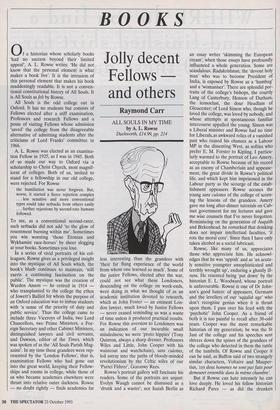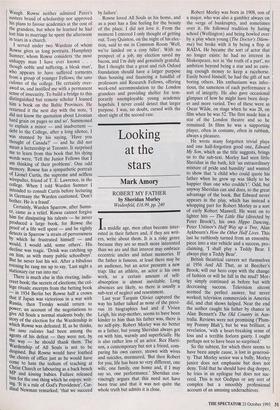BOOKS
Jolly decent Fellows and others
Raymond Carr
ALL SOULS IN MY TIME by A. L Rowse Duckworth, £14.99, pp. 214 Of a historian whose scholarly books 'had no success beyond their limited appeal', A. L. Rowse writes: 'He did not know that the personal element is what makes a book live'. It is the intrusion of this personal element that makes his book maddeningly readable. It is not a conven- tional constitutional history of All Souls. It is All Souls as felt by Rowse.
All Souls is the odd college out in Oxford. It has no students but consists of Fellows elected after a stiff examination, Professors and research Fellows and a posse of visiting Fellows whose admission `saved' the college from the disagreeable alternative of admitting students after the criticisms of Lord Franks' committee in 1966.
A. L. Rowse was elected as an examina- tion Fellow in 1925, as I was in 1945. Both of us made our way to Oxford via a scholarship to Christ Church, most magnif- icent of colleges. Both of us, invited to stand for a fellowship in our old college, were rejected. For Rowse
the humiliation was never forgiven. But, worse, it started a fierce rejection complex . .. less sensitive and more conventional types could take setbacks from others easily . .. further rejections by second-rate humans followed.
To me, as a conventional second-rater, such setbacks did not add `to the glow of resentment burning within me'. Sometimes you win worsting 'those Etonian and Wykhamist race-horses' by sheer slogging at your books. Sometimes you lose.
In a series of vivid portraits of his col- leagues, Rowse gives us a privileged insight into the mystique of All Souls which, the book's blurb continues to maintain, 'still exerts a continuing fascination on the public'. The mystique was the creation of Warden Anson — he retired in 1914 who transplanted to the college the ethos of Jowett's Balliol for whom the purpose of an Oxford education was to imbue students with 'a sense of the priority of duty and public service'. Thus the college came to include three Viceroys of India, two Lord Chancellors, two Prime Ministers, a For- eign Secretary and other Cabinet Ministers, distinguished lawyers and civil servants, and Dawson, editor of the Times, which was spoken of as the 'All Souls Parish Mag- azine'. In my time these grandees were rep- resented by the 'London Fellows', that is, examination Fellows who had gone out into the great world, keeping their Fellow- ships and rooms in college, while those of us who became academics elsewhere were thrust into relative outer darkness. Rowse — no doubt rightly — finds academics far Iess interesting than the grandees with `their far flung experience of the world from whom one learned so much'. Some of the junior Fellows, elected after the war, could not see what these Londoners, descending on the college on week-ends, were doing in what we thought of as an academic institution devoted to research, which as John Foster — an eminent Lon- don lawyer, much loved by Junior Fellows — never ceased reminding us was a waste of time unless it produced practical results. For Rowse this aversion to Londoners was an indication of our incurable small mindedness; we were 'proto hippies' (Tony Quinton, always a sharp dresser, Professors Wiles and Little, John Cooper with his waistcoat and watchchain), sans culottes, led astray into the paths of bloody-minded revolutionism by the Celtic wiles of our `Partei Ftihrer', Goronwy Rees.
Rowse's portrait gallery will fascinate his readers. Some of the portraits are unjust: Evelyn Waugh cannot be dismissed as a `drunk and a waster', nor Isaiah Berlin as an essay writer 'skimming the European cream', when those essays have profoundly influenced a whole generation. Some are scandalous. Radakrishnan, the 'devout holy man' who was to become President of India, is exposed by Rowse as a 'humbug' and a 'womaniser'. There are splendid por- traits of the college's bishops, the courtly Lang of Canterbury, Henson of Durham, the iconoclast, the dour Headlam of Gloucester; of Lord Simon who, though he loved the college, was loved by nobody, and whose attempts at spontaneous familiar intercourse appalled the young. Simon was a Liberal minister and Rowse had no time for Liberals, as awkward relics of a vanished past who ruined his chances as a Labour MP in the dissenting West, as softies who prefer E. M. Forster to Kipling. I particu- larly warmed to the portrait of Leo Amery, acceptable to Rowse because of his record as an enemy of Chamberlain and appease- ment, the great divide in Rowse's political life, and which kept him imprisoned in the Labour party as the scourge of the estab- lishment appeasers. Rowse accuses the young sans culottes of the college of scorn- ing the lessons of the grandees. Amery gave me long after-dinner tutorials on Cab- inet government for my lectures and gave me wise counsels that I've never forgotten. Reminiscing on the generation of Asquith and Birkenhead, he remarked that drinking does not impair intellectual faculties, 'it rots the moral core'. Since then I have only taken alcohol as a social lubricant.
Rowse, like many of us, appreciates those who appreciate him. He acknowl- edges that he was 'uppish' and as 'an acute- ly sensitive youngster unsophisticated and terribly wrought up', enduring a ghastly ill- ness. He resented being 'put down' by the historian E. L. Woodward, whose portrait is unfavourable. Rowse is one of Dr John- son's good haters: of appeasers, Germans and the levellers of our 'squalid age' who don't recognise genius when it is thrust upon them. I pass over his feud with the `psychotic' John Cooper. As a friend of both it is too painful to recall after 30-odd years. Cooper was the most remarkable historian of my generation; he was the St Just of the college and his speeches sent shivers down the spines of the grandees of the college who detected in them the rattle of the tumbrils. Of Rowse and Cooper it can be said, as Buffon said of two strangely similar characters, Voltaire and Mauper- tius, rces deux hommes ne sont pas faits pour demeurer ensemble dans la mane chambre'.
But if Rowse can hate intensely he, can love deeply. He loved his fellow historian Richard Pares — as did the drunken Waugh. Rowse neither admired Pares's austere brand of scholarship nor approved his plans to favour academics at the cost of the grandees, but when he learned he had lost him to marriage he spent the afternoon in tears in a church.
I served under two Wardens of whom Rowse gives us long portraits. Humphrey Sumner, whom Rowse considers the most unhappy man I have ever known . . though noble and suffering, a bleak man', who appears to have suffered torments from a group of younger Fellows, the sans culottes of the college. He certainly over- awed us, and instilled me with a permanent sense of insecurity. To build a bridge to this distinguished but remote scholar I loaned him a book on the Baltic Provinces. He returned it the next day with the note, `I did not know the quotation about Livonian hard grain on pages so and so'. Summoned to explain a minor — and inadvertent debt to the College, after a long silence, I was stunned by his saying, 'Have you thought of Canada?' — and he did not mean a lectureship at Toronto. It surprised me to learn from this book that his dying words were, 'Tell the Junior Fellows that I am thinking of their problems'. One odd memory. Rowse has a sympathetic portrait of Lionel Curtis, the supreme and selfless wirepuller, friend of T. E. Lawrence, in the college. When I told Warden Sumner I intended to consult Curtis before lecturing in Germany the Warden cautioned, 'Don't bother. He is a fraud'.
Certainly, Warden Sparrow, after Sumn- er, came as a relief. Rowse cannot forgive him for dissipating his talents — he never produced a large book, for Rowse the proof of a life well spent — and he rightly detects in Sparrow 'a strain of perverseness by which he frustrated himself — and would, I would add, some others'. His decline was tragic. `Drink was catching up on him, as with many public schoolboys'. But he never lost his wit. After a bibulous evening he rang me up to say, `Last night a stationary car ran into me'. There is much else in this riveting, indis- creet book; the secrets of elections; the col- lege rituals; excerpts from the betting book in 1934 Berlin bet Rowse half a crown that if Japan was victorious in a war with Russia, then Trotsky would return to Power; an account of the negotiations to give All Souls a normal students body; the story of the election for the Wardenship in which Rowse was defeated. If, as he thinks, the sans culottes had been among the agents of his defeat — they were not, by the Way — he should thank them. The Wardenship of All Souls is not to be despised. But Rowse would have loathed the chores of office just as he would have come to hate the tedium of teaching at Christ Church or labouring as a back bench MP and kissing babies. Failure released him for the one thing which he enjoys: writ- ing. 'It is a rule of God's Providence', Car- dinal Newman remarked, `that we succeed by failure'.
Rowse loved All Souls as his home, and as a poet has a fine feeling for the beauty of the place. I did not love it. From the moment I entered I only thought of getting out. Tony Quinton, on the night of his elec- tion, said to me in Common Room 'Well, we've landed on a cosy billet'. With no prospect of a job, my election saved my bacon, and I'm duly and genuinely grateful. But I thought that a great and rich Oxford foundation should have a larger purpose than housing and financing a handful of professors and Research Fellows, offering week-end accommodation to the London grandees and providing shelter for tem- porarily unemployable young academic hopefuls. I never could detect that larger purpose. I was, no doubt, cursed with the short sight of the second rate.



































































 Previous page
Previous page